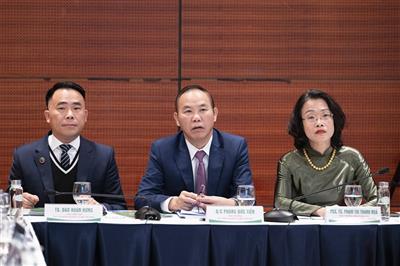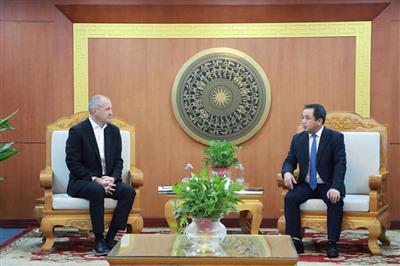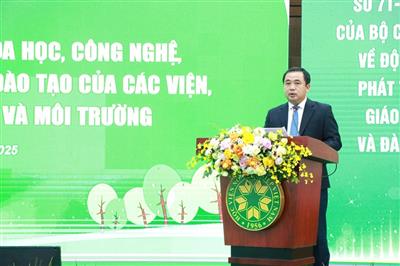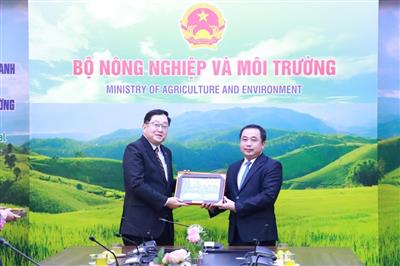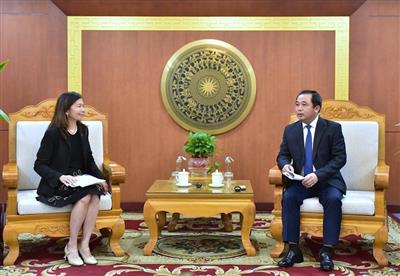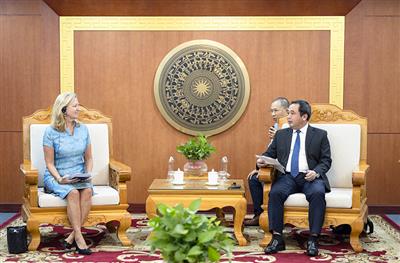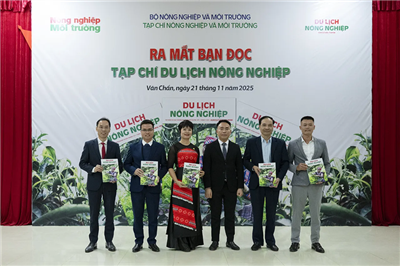
Vietnam and Japan enhance collaboration on emissions cuts and carbon credit exchange
15/01/2025TN&MTOn January 13, Minister of Natural Resources and Environment Do Duc Duy held a working meeting with leaders of Japan’s Erex Corporation to discuss strategies for reducing greenhouse gas emissions, the implementation of the Joint Crediting Mechanism (JCM), and issues related to carbon credit exchange between the two countries. This meeting marked a significant step in promoting renewable energy development and achieving emissions reduction targets for both Vietnam and Japan.
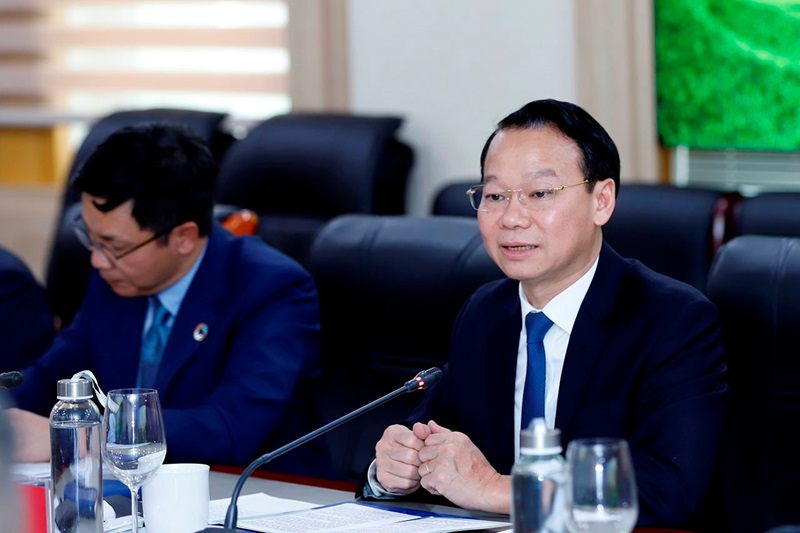
Minister Do Duc Duy held a working meeting with leaders of Japan’s Erex Corporation
During the meeting, Honna Hitoshi, Chairman and CEO of Erex Corporation, highlighted the company's pioneering efforts in renewable energy development, particularly in biomass power. He emphasized Erex’s commitment to investing in projects that reduce greenhouse gas emissions in Vietnam and expressed the company’s desire to collaborate closely with the Ministry of Natural Resources and Environment to advance carbon credit exchange under the JCM framework.
Erex has been actively implementing biomass power projects in Vietnam, notably in the provinces of Yên Bái and Tuyên Quang. These projects aim to utilize Vietnam’s abundant biomass resources while increasing the share of renewable energy in the country’s electricity supply. The development of biomass power not only reduces dependence on fossil fuels but also brings economic benefits to local communities by creating jobs and enhancing the value of agricultural byproducts.
Additionally, Honna underscored the critical role of carbon credits in incentivizing emissions reduction projects. He expressed Erex’s interest in deepening cooperation with Vietnam in this field and called for further support from the Ministry to facilitate carbon credit exchange mechanisms between the two countries.
Vietnam’s commitment to sustainable development and JCM cooperation
In response, Minister Do Duc Duy acknowledged Erex’s contributions to Vietnam’s renewable energy sector. He stressed that biomass power projects play a crucial role in cutting emissions while aligning with Vietnam’s Power Development Plan for 2021–2030, with a vision extending to 2050.
The Minister reaffirmed Vietnam’s strong commitment to sustainable development, particularly in its goal of achieving net-zero emissions by 2050. He emphasized that this ambitious target necessitates a significant transition in the energy sector, shifting from fossil fuel reliance to the expansion of renewable energy sources such as wind, solar, and biomass power.
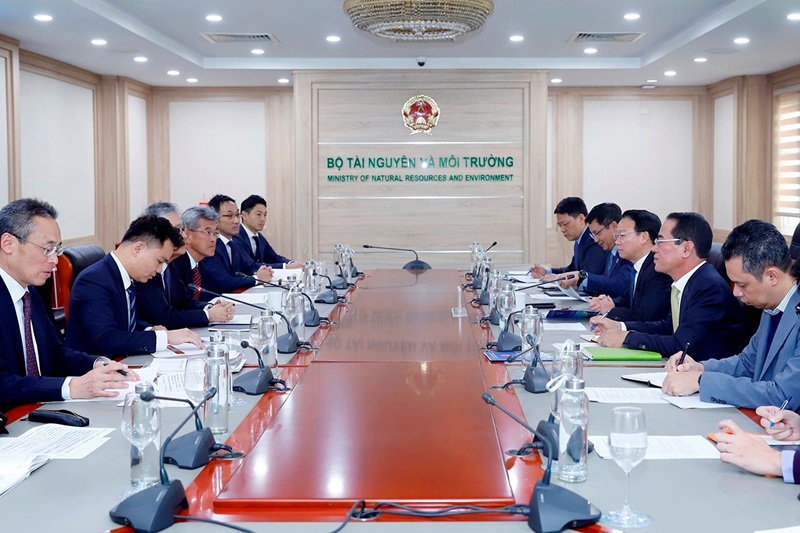
Minister Do Duc Duy expressed appreciation for Honna Hitoshi’s insights and Erex’s proactive approach in emissions reduction
Regarding the JCM—a Japanese-led initiative to support developing countries in reducing greenhouse gas emissions through bilateral cooperation—Minister Do Duc Duy noted that Vietnam is actively engaging in discussions with Japan. He revealed that during the 9th Joint Committee Meeting between Vietnam and Japan on October 31, 2024, Vietnam proposed further negotiations toward signing an international agreement on JCM implementation.
He further stated that Japan is currently undergoing internal consultations on Vietnam’s proposal, and the Vietnamese government anticipates a prompt response to expedite the necessary legal processes. Once signed, this agreement will provide a solid legal framework for collaborative activities under JCM.
Discussions on carbon credit allocation and regulatory frameworks
A key topic of discussion was the allocation of carbon credits. Minister Do Duc Duy emphasized that before an international JCM agreement is finalized, the Vietnam-Japan Joint Committee must establish clear guidelines for distributing carbon credits among pilot projects. This step is essential to balancing the interests of all stakeholders and fostering business participation in emissions reduction initiatives.
Regarding Erex’s specific proposal on carbon credit allocation ratios, the Minister assigned the Department of Climate Change to conduct further studies and present recommendations at upcoming Joint Committee meetings.
Additionally, the Minister provided an update on Vietnam’s regulatory developments, noting that the Ministry of Natural Resources and Environment is currently drafting a government decree on managing international carbon credit transactions. This decree will outline rules for allowing partner countries to use purchased carbon credits to contribute to their Nationally Determined Contributions (NDCs) under the Paris Agreement. The framework aims to ensure that international carbon credit exchanges align with Vietnam’s climate commitments.
Strengthening Vietnam-Japan cooperation in climate action
Concluding the meeting, Minister Do Duc Duy expressed appreciation for Honna Hitoshi’s insights and Erex’s proactive approach in emissions reduction. He reiterated Vietnam’s desire for continued support from Japan, its government, and private sector partners in implementing climate mitigation projects, particularly in renewable energy.
The Minister emphasized that carbon credit exchange mechanisms not only accelerate emissions reduction efforts but also need to balance the interests of all involved parties. He underscored that Vietnam aspires to become a leader in low-carbon technology development and that Vietnam-Japan collaboration in this field could serve as a model for other nations.
With the positive momentum from this meeting, both sides anticipate deeper cooperation in the coming years, contributing to the shared objective of achieving Net-Zero emissions by 2050.
Ngoc Huyen




